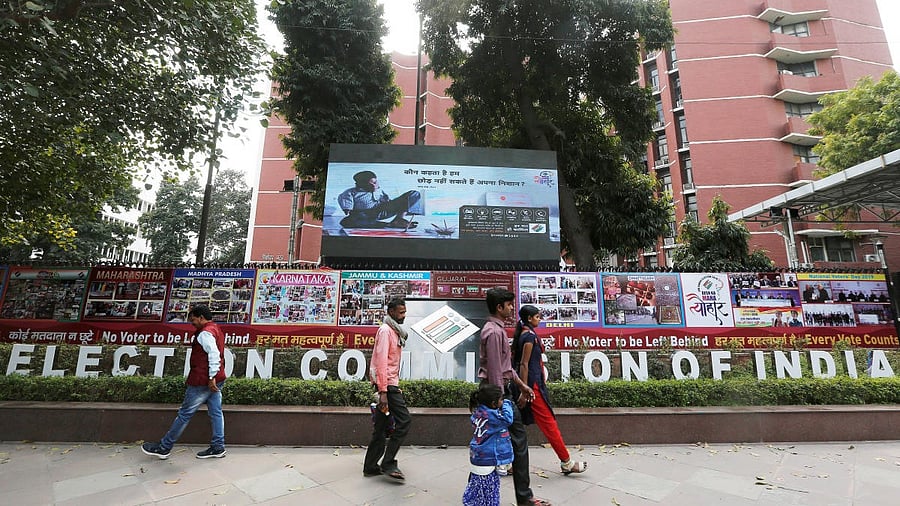
People walk past the Election Commission office in Delhi.
Credit: Reuters Photo
The Election Commission (EC)’s combative dismissal of Congress leader Rahul Gandhi’s allegations of electoral malpractices or “vote chori”, rather than addressing them with transparency, has only fuelled public scepticism. When Rahul aired serious concerns about over one lakh fraudulent votes in Mahadevapura, including duplicate registrations, dubious addresses, and bulk voters in single-room dwellings, the EC’s response was telling. Instead of initiating a thorough investigation into its electoral rolls, the very documents that Rahul referenced, the Commission demanded he swear an affidavit under Rule 20 (3)(b) of the Registration of Electors Rules, 1960. This knee-jerk reaction misreads the law. Rule 14 explicitly allows complaints to be filed either in person or through registered post. Rule 20 comes into play much later, during evidentiary proceedings, after a preliminary inquiry. By skipping due process and prematurely insisting on oath, the EC appeared more keen to shield itself through procedural technicalities rather than probe into concerns rooted in its databases.
Subsequent media fact-checks have corroborated some of Rahul’s specific claims, notably bulk registrations from a small dwelling. Despite this, the EC offered only general rebuttals and did not address the allegations directly or provide concrete data refuting them. The second notice to Rahul demanding proof that a voter cast two ballots further exposes the Commission’s flawed approach. While the EC has claimed that the voter has denied this allegation, it has not clarified if it examined booth logs or CCTV footage to conclusively rule out impersonation. By shifting the burden of proof and the onus of investigation entirely onto the complainant, the EC is abdicating its role as a custodian of electoral integrity. Meanwhile, in the process of defending the EC, Karnataka BJP leaders have pointed out similar discrepancies in constituencies won by the Congress. The commission did not send them notices, nor did it issue veiled threats of legal action for false claims, as it did with Rahul. This uneven scrutiny and selective outrage could undermine EC’s claims of impartiality.
Beyond legalities, the EC’s reputation hinges on visible accountability and public perception of its fairness and responsiveness. The Commission should adopt a more proactive approach by swiftly conducting a systemic audit of suspect constituencies and issuing a point-to-point clarification where possible. To restore faith in its credibility, the Commission should adopt a transparent approach instead of defensive opacity and institutional stonewalling. As the democracy’s cornerstone, the EC must remember: Caesar’s wife must be above suspicion.
